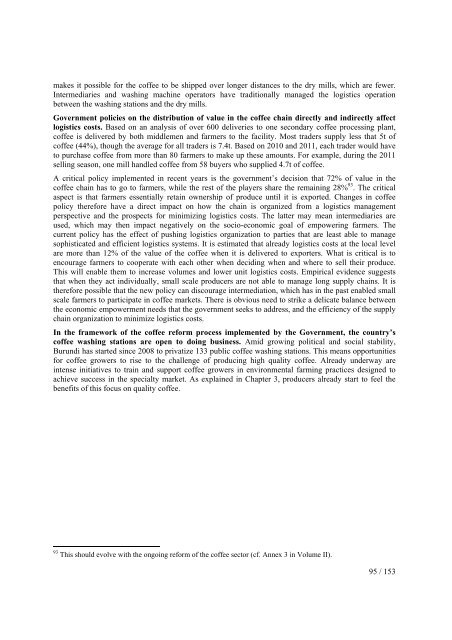(DTIS) Update, Volume 1 â Main report - Enhanced Integrated ...
(DTIS) Update, Volume 1 â Main report - Enhanced Integrated ...
(DTIS) Update, Volume 1 â Main report - Enhanced Integrated ...
Create successful ePaper yourself
Turn your PDF publications into a flip-book with our unique Google optimized e-Paper software.
makes it possible for the coffee to be shipped over longer distances to the dry mills, which are fewer.Intermediaries and washing machine operators have traditionally managed the logistics operationbetween the washing stations and the dry mills.Government policies on the distribution of value in the coffee chain directly and indirectly affectlogistics costs. Based on an analysis of over 600 deliveries to one secondary coffee processing plant,coffee is delivered by both middlemen and farmers to the facility. Most traders supply less that 5t ofcoffee (44%), though the average for all traders is 7.4t. Based on 2010 and 2011, each trader would haveto purchase coffee from more than 80 farmers to make up these amounts. For example, during the 2011selling season, one mill handled coffee from 58 buyers who supplied 4.7t of coffee.A critical policy implemented in recent years is the government’s decision that 72% of value in thecoffee chain has to go to farmers, while the rest of the players share the remaining 28% 93 . The criticalaspect is that farmers essentially retain ownership of produce until it is exported. Changes in coffeepolicy therefore have a direct impact on how the chain is organized from a logistics managementperspective and the prospects for minimizing logistics costs. The latter may mean intermediaries areused, which may then impact negatively on the socio-economic goal of empowering farmers. Thecurrent policy has the effect of pushing logistics organization to parties that are least able to managesophisticated and efficient logistics systems. It is estimated that already logistics costs at the local levelare more than 12% of the value of the coffee when it is delivered to exporters. What is critical is toencourage farmers to cooperate with each other when deciding when and where to sell their produce.This will enable them to increase volumes and lower unit logistics costs. Empirical evidence suggeststhat when they act individually, small scale producers are not able to manage long supply chains. It istherefore possible that the new policy can discourage intermediation, which has in the past enabled smallscale farmers to participate in coffee markets. There is obvious need to strike a delicate balance betweenthe economic empowerment needs that the government seeks to address, and the efficiency of the supplychain organization to minimize logistics costs.In the framework of the coffee reform process implemented by the Government, the country’scoffee washing stations are open to doing business. Amid growing political and social stability,Burundi has started since 2008 to privatize 133 public coffee washing stations. This means opportunitiesfor coffee growers to rise to the challenge of producing high quality coffee. Already underway areintense initiatives to train and support coffee growers in environmental farming practices designed toachieve success in the specialty market. As explained in Chapter 3, producers already start to feel thebenefits of this focus on quality coffee.93 This should evolve with the ongoing reform of the coffee sector (cf. Annex 3 in <strong>Volume</strong> II).95 / 153
















